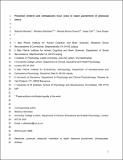Files in this item
Preschool children and chimpanzees incur costs to watch punishment of antisocial others
Item metadata
| dc.contributor.author | Mendes, Natacha | |
| dc.contributor.author | Steinbeis, Nikolaus | |
| dc.contributor.author | Bueno-Guerra, Nereida | |
| dc.contributor.author | Call, Josep | |
| dc.contributor.author | Singer, Tania | |
| dc.date.accessioned | 2018-06-18T23:32:12Z | |
| dc.date.available | 2018-06-18T23:32:12Z | |
| dc.date.issued | 2018-01 | |
| dc.identifier | 251516232 | |
| dc.identifier | 4e17be08-c227-4964-9d01-4afb0f686c3c | |
| dc.identifier | 85042773976 | |
| dc.identifier | 000428754400017 | |
| dc.identifier.citation | Mendes , N , Steinbeis , N , Bueno-Guerra , N , Call , J & Singer , T 2018 , ' Preschool children and chimpanzees incur costs to watch punishment of antisocial others ' , Nature Human Behaviour , vol. 2 , no. 1 , pp. 45-51 . https://doi.org/10.1038/s41562-017-0264-5 | en |
| dc.identifier.issn | 2397-3374 | |
| dc.identifier.other | ORCID: /0000-0002-8597-8336/work/39933592 | |
| dc.identifier.uri | https://hdl.handle.net/10023/14220 | |
| dc.description | N.S. was supported by the European Research Council (European Research Council (ERC) grant agreement no. 715282, project DEVBRAINTRAIN), as well as a Jacobs Research Fellowship. J.C. was supported in part by the ERC (grant agreement no. 609819, project SOMICS). N.B.-G. was supported by an FPU scholarship from the Spanish Ministry of Education (ref. FPU12/00409). | en |
| dc.description.abstract | When misfortune befalls another, humans may feel distress, leading to a motivation to escape. When such misfortune is perceived as justified, however, it may be experienced as rewarding and lead to motivation to witness the misfortune. We explored when in human ontogeny such a motivation emerges and whether the motivation is shared by chimpanzees. Chimpanzees and four- to six-year-old children learned through direct interaction that an agent was either prosocial or antisocial and later saw each agent’s punishment. They were given the option to invest physical effort (chimpanzees) or monetary units (children) to continue watching. Chimpanzees and six-year-olds showed a preference for watching punishment of the antisocial agent. An additional control experiment in chimpanzees suggests that these results cannot be attributed to more generic factors such as scene coherence or informational value seeking. This indicates that both six-year-olds and chimpanzees have a motivation to watch deserved punishment enacted. | |
| dc.format.extent | 7 | |
| dc.format.extent | 1781595 | |
| dc.language.iso | eng | |
| dc.relation.ispartof | Nature Human Behaviour | en |
| dc.subject | Prosocial | en |
| dc.subject | Antisocial | en |
| dc.subject | Motivation to watch deserved punishment | en |
| dc.subject | Chimpanzees | en |
| dc.subject | Children | en |
| dc.subject | H Social Sciences | en |
| dc.subject | RC0321 Neuroscience. Biological psychiatry. Neuropsychiatry | en |
| dc.subject | NDAS | en |
| dc.subject | BDC | en |
| dc.subject | R2C | en |
| dc.subject.lcc | H | en |
| dc.subject.lcc | RC0321 | en |
| dc.title | Preschool children and chimpanzees incur costs to watch punishment of antisocial others | en |
| dc.type | Journal article | en |
| dc.contributor.sponsor | European Research Council | en |
| dc.contributor.institution | University of St Andrews. Centre for Social Learning & Cognitive Evolution | en |
| dc.contributor.institution | University of St Andrews. School of Psychology and Neuroscience | en |
| dc.identifier.doi | 10.1038/s41562-017-0264-5 | |
| dc.description.status | Peer reviewed | en |
| dc.date.embargoedUntil | 2018-06-18 | |
| dc.identifier.url | https://www.nature.com/articles/s41562-017-0264-5#Sec17 | en |
| dc.identifier.grantnumber | 609819 | en |
This item appears in the following Collection(s)
Items in the St Andrews Research Repository are protected by copyright, with all rights reserved, unless otherwise indicated.

